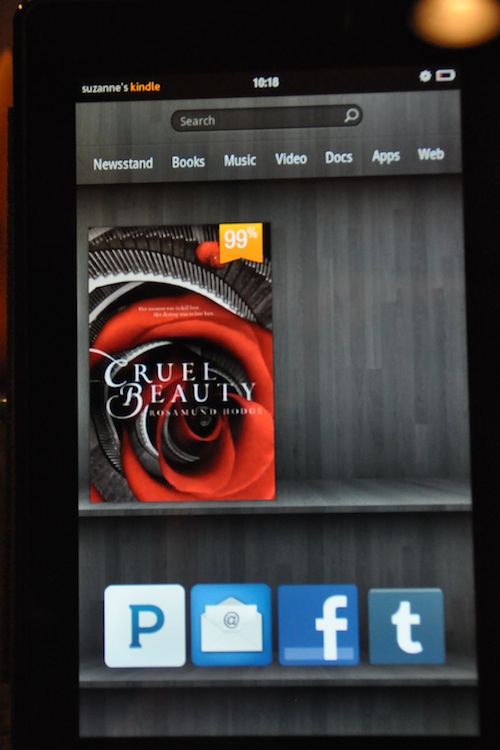What can I say except welcome to Pandora’s book.
“Cruel Beauty” by Rosamund Hodge will take you on a wicked journey with truly flawed characters. They lie, murder, double-cross and are far more compelling than your usual heros and villains.
Trapped in Ignifex’s castle as his latest bride, Nyx becomes entranced by Ignifex as well as his look-alike butler. But no matter her feelings for the boys, her whole life she was trained to destroy the castle and bring down Ignifex in revenge for her mother’s death.
What is a girl to do?
Hodge only adds to the gripping journey of our heroine Nyx by adding myths from Pandora’s box to Cupid & Psyche to Bluebeard.
I haven’t been as riveted by a book in a very long time. None of the characters were exactly likeable as they didn’t have many of the usual heroic characteristics expected in a heroine or hero, like mercy and kindness, and yet I rooted for their happiness.
I was sympathetic to their causes, including the villain who was stuck between a hard place and a rock.
And now, here is an interview with our lovely author, Rosamund Hodge:
Give us 5 fun facts about you:
1. I have studied Spanish, French, Latin, Old Norse, and Japanese. Sadly, I never became fluent in any of them.
2. I vowed to become a writer when I was eight years old, because my older brother had told me I was too young to join his writing club and I wanted to make him sorry.(He still isn’t sorry.)
3. I went to college in Dallas, but I got my master’s degree (in medieval English literature) at Oxford.
4. I practice Shorinji Kempo, a Japanese martial art based on Shaolin Kung Fu.
5. I prefer Luke Skywalker to Han Solo.
Cruel Beauty is truly one of the most unique stories I’ve read in awhile, especially given its mix of Beauty and the Beast as well as other fairytales. What was your inspiration for this story?
Fun fact: when I was a child, I was not actually a big fan of Beauty and the Beast. I liked it just fine, but it didn’t excite me much. But I was a huge, huge fan of Greek mythology, and my very favorite story was the myth of Cupid and Psyche. Briefly—an oracle tells the king he has to sacrifice his daughter to a “monster.” But the daughter, Psyche, isn’t devoured by a beast as she expects; instead, the wind carries her to a strange palace with invisible servants who tell her that she is a bride. And every night her husband comes to visit her—but he forbids her to see his face. When her jealous sisters persuade her light a candle anyway, she discovers that he’s Cupid, the god of love. But because she broke his command, he becomes a prisoner of his mother Venus, and Psyche must complete a series of impossible tasks—ultimately going to the Underworld—in order to free him.
I’ve loved this story since I was little, but I never planned to write a retelling of it. In a way, it felt too perfect: what could I add? Then a few years ago, I read the fairy tale “East of the Sun, West of the Moon,” which is basically a half-and-half mix of Beauty and the Beast with Cupid and Psyche. Instantly, all three stories were inseparable in my head, and all three were ten times as exciting. And it was in the places that those stories diverged and intertwined that I found my inspiration.
And how was it combining all these different myths and fairytales? How did you choose what to include and why?
Well, obviously, I had to include elements of all three stories I mentioned above, since they’re what gave me the idea for the novel in the first place!
I added the Bluebeard elements because Bluebeard is a mirror image of Beauty and the Beast. In one story, a girl goes to a strange house to live with a terrifying monster, but when she agrees to marry him, she finds out that he’s really a man. In the other, a girl marries a handsome man, but when she goes to his strange house, she finds out that he’s really a monster.
The Pandora elements I added mostly because I wanted more Greek myth, and because they’re useful to the plot. But looking back, I can see that the story also fit because—like Cupid and Psyche—it’s the story of a woman who dares to look where’s she’s forbidden, and who suffers because of it.
I love your main characters. They’re completely flawed with feelings of cowardice, hate, anger, etc. Not exactly your average hero and heroine, and yet they’re sympathetic, and as the reader I root for them and fall in love with them. How did you make characters with unheroic traits so likeable?
That’s kind of a funny question to me, because when I was writing CRUEL BEAUTY, I really wanted to make Nyx not a nice person, and I wanted to make Ignifex a bad boy who was truly bad.
But I did still want to make them sympathetic. With Nyx, the main thing I did was try to make her aware of when she was being unjust and unkind. I ended up drawing a lot on my own teenage years to write about that. Now, I had a very happy childhood and my parents hardly ever sold me to demon princes. But I did have a bad temper, so I knew very well the horrible feeling of being furious while knowing you had no right be furious. And I’d always loved heroines who struggled with genuinely ugly feelings. So I tried to do that with Nyx.
Ignifex was tricky. I wanted him to be genuinely bad, so that meant the romance between him and Nyx had to be genuinely problematic. But I didn’t want it to be too creepy, or I wouldn’t be able to enjoy it when they got together. So I made sure that nobody ever forgot what Ignifex did as ruler of Arcadia. I made sure that Nyx knew that being Ignifex’s prisoner was unjust and creepy. But I did my best to keep Ignifex from being creepy towards her. Which is why Nyx is the one who always escalates the relationship. (For instance: the first two times they kiss, she is the one who initiates it.)
What advice would you give for aspiring writers?
Don’t be dignified.
When I was in my early teens I wrote a lot of terrible, terrible stories, because that’s what you do when you’re starting out. But my terrible stories were also very melodramatic. When I started to claw my way towards better writing skills, I became very ashamed of my earlier writings, and I decided that the melodrama was part of the problem. So I spent years trying to write stories that were dignified. And it’s not that the time was wasted, because I was writing, and it’s not that the stories were all bad, because they had their good points. But they were resoundingly mediocre.
And then one day I thought, “Forget this. I’m going to write a book that’s crazy and melodramatic and completely embarrassing.”
So I did. It was the most fun that I’d had in years. That book was not Cruel Beauty. But writing it made me realize that if a book isn’t melodrama, it’s dead on the page for me. (When writing, that is. I’ve loved reading plenty of books that are perfectly respectable.) And that realization was what gave me the courage to write Cruel Beauty.
So my advice is: forget dignity. Write what you love.
What do you have coming out next?
On April 1, my ebook novella Gilded Ashes is coming out. It’s set in the same world as Cruel Beauty, and it’s a retelling of Cinderella, which is a fairy tale that most people feel needs an explanation. Traditionally, Cinderella is sweet, obedient, and cheerful despite being relentlessly abused. Why doesn’t she rebel against her wicked stepmother? If she’s too broken to rebel, why is she happy?
I started thinking about the Brothers Grimm version of the story, where Cinderella doesn’t have a fairy godmother; instead, it’s the ghost of her dead mother who gives her the dress and sends her to the ball. I wondered, why would a mother haunt her daughter? To protect her, of course. And suddenly it all became clear: Cinderella’s dead mother haunts the house and destroys anyone who makes her daughter cry. So no matter what her stepfamily does to her, Cinderella has to smile and be happy. Or all of them will die.
But, of course, everything gets a lot more complicated when she falls in love.















































